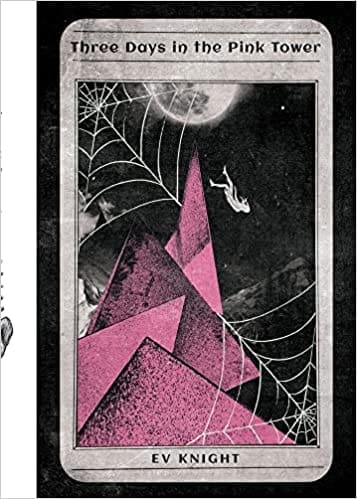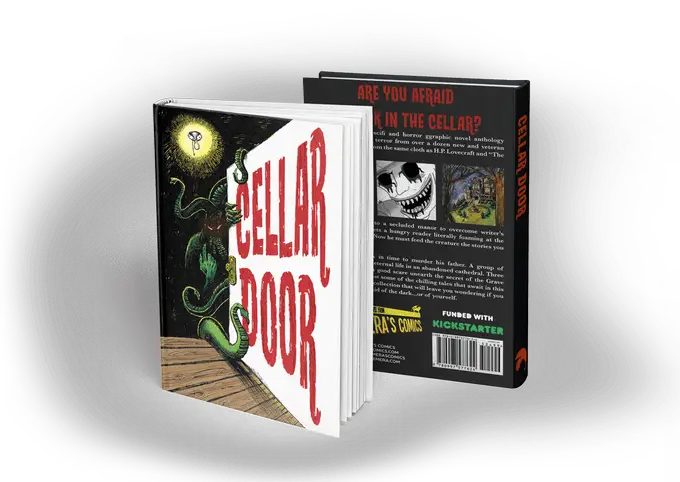Epeolatry Book Review: Three Days in the Pink Tower by EV Knight

Disclosure:
Our reviews may contain affiliate links. If you purchase something through the links in this article we may receive a small commission or referral fee. This happens without any additional cost to you.

Title: Three Days in the Pink Tower
Author: EV Knight
Publisher: Creature Publishing, LLC
Genre: Occult
Release Date: July 12th, 2022
Synopsis: Josey Claypool begins the summer before her senior year at a carnival, where a fortune teller with milky-white eyes gives her a foreboding tarot reading. She’s spooked, but nothing could prepare her for the following day when two strange men show up at her front door. Josey is kidnapped at gunpoint and brought to a pink cabin in the woods where she is held prisoner. In her darkest moment, the fortune teller appears and gives her a deck of tarot cards, which she must cast and interpret in a fight for her life.
In this work of speculative autofiction, award-winning author EV Knight reclaims the narrative of her own past in an exploration of trauma, agency, and survival.
You are going to want to sit down for this book. No—that’s not right. You are going to want to sit down, and grieve—sobbing or silently—for this book…especially if you are a survivor of sexual assault. In EV Knight’s Three Days in the Pink Tower, a teenaged girl is kidnapped, held hostage, brutally assaulted, and survives—no spoiler there, if one reads the Foreword—but this is not a rape revenge story. This is not a weepy memoir. Instead, Knight incorporates the mysticism inherent in Tarot cartomancy, and it not only works, it weaves a spellbinding story that will leave the reader viscerally affected for some time.
At its heart, Three Days in the Pink Tower is a chilling feminist thriller painted with an artist’s erudite brush of magical realism. As she drives the story forward, Knight straddles the line between straightforward plot and social commentary without ever losing her firm hold on the wheel. The concept of what sexual assault does to its victims, what it steals, is alluded to without feeling clinical or preachy. When Josey Claypool is first lured from the safety of her home and forced into leaving with her captors, her intuition warns her that this is a journey from which she will never return, if not physically, then psychologically and spiritually: “If I leave this house with this man and this gun, if I get into that car with that other man, I will never come home again. I know this in my heart. Girls who get taken away—kidnapped or at gunpoint—do not come back alive. Sometimes they’re found. Sometimes they’re just a segment on Unsolved Mysteries. But they never come back. I am now one of those girls.”
Every detail of the setting is meticulously crafted to evoke a heavy mood of danger and a foreshadowing of both the desecration and desolation assault survivors often experience. When Josey is forced into her assailants’ car, “Flat Top opens the back door on the driver’s side and tells me to scoot in. I do as he says; the gun is a great motivator. The car itself is a horror show. I wonder if I’ll die in there. The space behind the back seat is filled with trash—plastic wrappers, empty bakery cookie trays, a plastic bag of clothes, empty fast-food cups and French fry containers. The front passenger seat is being held up by a two-by-four wedged between it and the back seat.”
The fortune teller whom Josey meets at a local traveling carnival early in the book—a repeating image in the storyline—is an archetypal Wise Woman from whom the protagonist receives guidance in order to survive. In one scene, the woman is rinsing a piece of soiled clothing, and “It seems that no matter what she does, the blood remains permanently affixed to the fibers of cloth.” It is a heavy statement on the impact trauma has on its victims, and the true horror of Three Days lies in the reader’s gradual understanding that every moment of Josey’s imprisonment not only steals a piece of her, it will haunt her for the remainder of her life.
The author reveals in the Foreword what drove her to write the novella: “The story you are about to read is based on that moment in my life—on the ‘incident’ that took away that future, that altered me in such a way that now, thirty years later, I’m just beginning to see the ghost of the girl I once was peeking through the protective walls I built around my soul.” Knight could have chosen to write a memoir; despite her statements to the contrary, the Bram Stoker Award winner has lived, and continues to live, an interesting life. She channeled her trauma into a work of fiction that is unique, gut-wrenching, and cathartic in a way most horror—even most feminist horror—is not.
Three Days in the Pink Tower is a fast-paced read: Knight never takes her foot off the accelerator. Even when the details of a scene are too horrific for readers to face, the author establishes such an unspoken trust with them, it is impossible to look away. Knight promises from the get-go that she will steer Josey to safe harbor, even though the journey is one of unfathomable terror, and she delivers with a few unexpected twists along the way and a climax that will hold the readers fixed to their seats.
![]() /5
/5
- About the Author
- Latest Posts
Rebecca Rowland is an award-winning dark fiction author and the best-selling editor of seven horror anthologies. Find links to her latest work on RowlandBooks.com, take a peek at what shiny object she’s fixating on @Rebecca_Rowland_books on Instagram, or just look for her table at author conventions: she’s that painfully awkward gal who can’t sit still.













